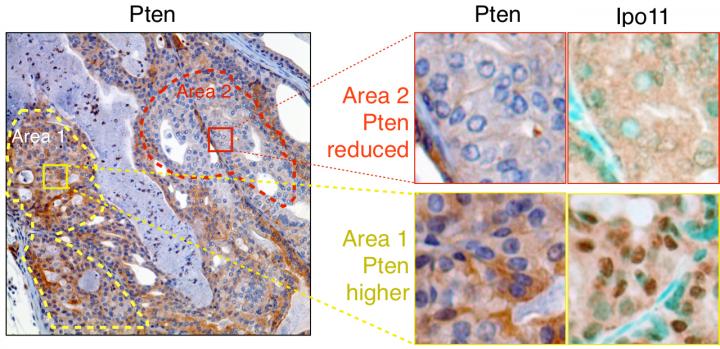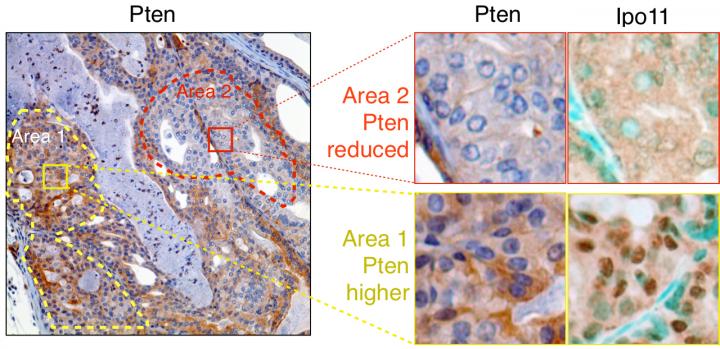
Credit: Trotman Lab, CSHL
Cold Spring Harbor, NY — Researchers at Cold Spring Harbor Laboratory (CSHL) have discovered that a protein called Importin-11 protects the anti-cancer protein PTEN from destruction by transporting it into the cell nucleus. A study they publish today in The Journal of Cell Biology suggests that the loss of Importin-11 may destabilize PTEN, leading to the development of lung, prostate, and other cancers.
PTEN prevents tumor cells from growing uncontrollably, and mutations in the gene encoding this protein are commonly found in many different types of cancer. Some patients, however, show low levels of the PTEN protein even though their PTEN genes are normal. CSHL Associate Professor Lloyd Trotman and colleagues discovered that this may be due to defects in Importin-11, which transports PTEN into the nucleus, sheltering PTEN from proteins in the cell's cytoplasm that would otherwise target it for degradation.
Several cytoplasmic proteins — NEDD4-1, NDFIP1, and UBE2E1 — combine to tag PTEN with the small molecule ubiquitin. PTEN tagged with multiple ubiquitin molecules can then be recognized and destroyed by the cell's protein degradation machinery. Trotman and colleagues found that Importin-11 protects PTEN from degradation by escorting not only PTEN but also UBE2E1 into the nucleus, thereby breaking up the cytoplasmic ubiquitination apparatus.
Mice lacking Importin-11 showed lower levels of PTEN protein and developed lung adenocarcinomas and prostate neoplasias. Mutations in the gene encoding Importin-11 have been identified in human cancers, and Trotman and colleagues found that tumors from lung cancer patients lacking Importin-11 tended to show low PTEN levels as well. The researchers estimate that loss of Importin-11 may account for the loss of PTEN in approximately one-third of lung cancer patients lacking this key anti-cancer protein.
In prostate cancer, loss of Importin-11 predicted disease relapse and metastasis in patients who had had their prostate removed. "We think that the degradation of PTEN after loss or impairment of Importin-11 is a very effective driver of human prostate cancer," says Trotman. "Our results suggest that Importin-11 is the 'Achilles' heel' of the ubiquitination system that maintains the correct levels of PTEN inside cells."
###
The research described here was supported by the American Cancer Society (RSG-14-069-01-TBE); Pershing Square Sohn Foundation; U.S. Department of Defense (W81XWH-13-PCRP-IDA); National Institutes of Health (CA137050 and support grant 5P30CA045508); Robertson Research Fund of Cold Spring Harbor Laboratory and National Institute of General Medical Sciences (1R01GM092900-03).
"The Nuclear Transport Receptor Importin-11 is a Tumor Suppressor that Maintains PTEN Protein," appears in The Journal of Cell Biology XXXXXXXX. The authors are: Muhan Chen, Dawid G. Nowak, Navneet Narula, Brian Robinson, Kaitlin Watrud, Alexandra Ambrico, Tali M. Herzka, Martha E. Zeeman, Matthias Minderer, Wu Zheng, Saya H. Ebbesen, Kendra S. Plafker, Carlos Stahlhut, Victoria M.Y. Wang, Lorna Wills, Abu Nasar, Mireia Castillo?Martin, Carlos Cordon?Cardo, John E. Wilkinson, Scott Powers, Raffaella Sordella, Nasser K. Altorki, Vivek Mittal, Brendon M. Stiles, Scott M. Plafker and Lloyd C. Trotman. The paper can be accessed at: http://jcb.rupress.org/
About Cold Spring Harbor Laboratory
Founded in 1890, Cold Spring Harbor Laboratory has shaped contemporary biomedical research and education with programs in cancer, neuroscience, plant biology and quantitative biology. Home to eight Nobel Prize winners, the private, not-for-profit Laboratory employs 1,100 people including 600 scientists, students and technicians. The Meetings & Courses Program hosts more than 12,000 scientists from around the world each year on its campuses in Long Island and in Suzhou, China. The Laboratory's education arm also includes an academic publishing house, a graduate school and programs for middle and high school students and teachers. For more information, visit http://www.cshl.edu
Media Contact
Peter Tarr
[email protected]
516-367-5055
@CSHLnews
Cold Spring Harbor Laboratory – Advancing the frontiers of biology through education and research
############
Story Source: Materials provided by Scienmag





